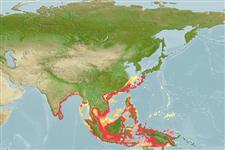Common names from other countries
Issue
Genus Eschmeyer, pers. comm.
Environment: milieu / climate zone / depth range / distribution range
Ecologia
marinhas; estuarina demersal; anfídromo (Ref. 51243); intervalo de profundidade 16 - 73 m (Ref. 57343). Tropical; 37°N - 11°S, 75°E - 149°E
Eastern Indian Ocean and Western Pacific: southwestern India to Papua New Guinea, north to Japan. May rarely occur in the Philippines, eastern Indonesia, and Papua New Guinea (Ref. 57343). Not in Red Sea (Ref. 84159).
Tamanho / Peso / Idade
Maturity: Lm ? range ? - ? cm
Max length : 30.0 cm TL macho/indeterminado; (Ref. 30573); common length : 20.0 cm TL macho/indeterminado; (Ref. 30573)
Espinhos dorsais (total) : 9; Raios dorsais (total) : 12 - 13; Espinhos anais: 3; Raios anais : 11 - 13; Vértebras: 24. With 6 pectoral filaments; uppermost not reaching posterior tip of pectoral fin. Pectoral fin, rays moderate, 19-25% of SL; all rays branched except uppermost 1 or 2. Second dorsal spine short, 5-8% of SL. Atrophied swim bladder, like a string. A large black spot anteriorly on lateral line (Ref. 40958, 41110). No upper lip; lower lip well-developed except at symphysis. Operculum broadly rounded; preoperculum coarsely serrated. Color is golden-olive above ,silvery below. A large oval blotch is at the start of the lateral line (Ref. 561).
A marine species found on sandy and muddy bottoms of the continental shelf (Ref. 4340, 11230, 57343). Frequently enters estuaries (Ref. 9685, 11230). Feeds mainly on small crustaceans (especially shrimps), fishes and benthic organisms; also on sponges and fish scales (Ref. 9685). The progression in this hermaphrodite is protandrous, changing from a juvenile to a hermaphrodite, then a female (Ref. 9685).
Ciclo de vida ou comportamento de acasalamento
Maturities | Reprodução | Spawnings | Egg(s) | Fecundities | Larvas
Motomura, H., 2004. Threadfins of the world (Family Polynemidae). An annotated and illustrated catalogue of polynemid species known to date. FAO Spec. Cat. Fish. Purp. Rome: FAO. 3:117 p. (Ref. 57343)
Status na Lista Vermelha da UICN (Ref. 130435)
CITES (Ref. 128078)
Not Evaluated
Ameaça para os humanos
Harmless
Uso pelos humanos
Pescarias: espécies comerciais; peixe esportivo: sim
Ferramentas
Relatórios especiais
Baixar XML
Fontes da internet
Estimates based on models
Preferred temperature (Ref.
115969): 23.5 - 28.4, mean 27.7 (based on 227 cells).
Índice de diversidade filogenética (Ref.
82804): PD
50 = 0.5000 [Uniqueness, from 0.5 = low to 2.0 = high].
Bayesian length-weight: a=0.01479 (0.00929 - 0.02354), b=3.04 (2.91 - 3.17), in cm Total Length, based on LWR estimates for this species & (Sub)family-body (Ref.
93245).
Nível Trófico (Ref.
69278): 3.8 ±0.57 se; based on food items.
Resiliência (Ref.
120179): médio(a), tempo mínimo de duplicação da população 1,4 - 4,4 anos (Preliminary K or Fecundity.).
Fishing Vulnerability (Ref.
59153): Low to moderate vulnerability (31 of 100).
